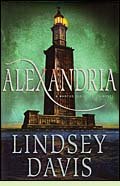|
Alexandriaby Lindsey DavisReviewed by Margaret Donsbach Perhaps most impressive is the Great Library. Said to have been destroyed by Julius Caesar when he conquered Egypt in 47 B.C., the Library probably survived at least into the reign of Domitian (A.D. 81-96), and possibly much later. Caesar's fire burned the harbor area, where some warehouses may have contained quantities of books, but not the library district. So when Falco and his family arrive, the Library, though somewhat in decline, is still the functioning first-century equivalent of a university. Falco's young brother-in-law is keen to enroll. Unfortunately, the sudden death of the Librarian shortly after attending a dinner party with Fulvius, Falco and family, sets off an academic wrangle of the kind all too familiar to modern university faculty. Of course, the modern wrangle probably would not involve an in-house rivalry between the astronomer and the zookeeper or an attack by an oversized, man-eating crocodile. An inverse of the locked-room puzzle appears, too: Why would a man who appears to have died at his desk without violence have been locked into his office from the outside? Falco narrates in a slangy, colloquial English, surely the counterpart to the slangy, colloquial Latin an Imperial informer familiar with the mean streets of Rome would have spoken. He also has a cheerfully cynical sense of humor and when not wrestling angry crocodiles makes a capital tour guide to the sights of first-century Alexandria. (2009; 338 pages, including a handy list of characters) More about Alexandria at Powell's Books or Amazon.com
The Ptolemies by Duncan Sprott (2004), about Ptolemy I Soter, who founded Alexandria after the death of Alexander the Great. More info The Judgment of Caesar by Steven Saylor (2004), a mystery set during the time of Caesar's conquest of Egypt, before he decides to install Cleopatra as ruler. More info A Stolen Tongue by Sheri Holman (1997), a mystery involving disappearing relics (the body parts of saints) and a fifteenth-century monk's pilgrimage to Alexandria. More info
What Happened to the Ancient Library of Alexandria?, edited by Mostafa El-Abbadi and Omnia Mounir Fathallah (2008). More info The Library of Alexandria: Centre of Learning in the Ancient World, edited by Roy MacLeod (2000). More info The Vanished Library: A Wonder of the Ancient World by Luciano Canfora (1990). More info
"What Happened to the Great Library of Alexandria?" at StraightDope.com Back to Novels of Ancient History
|
